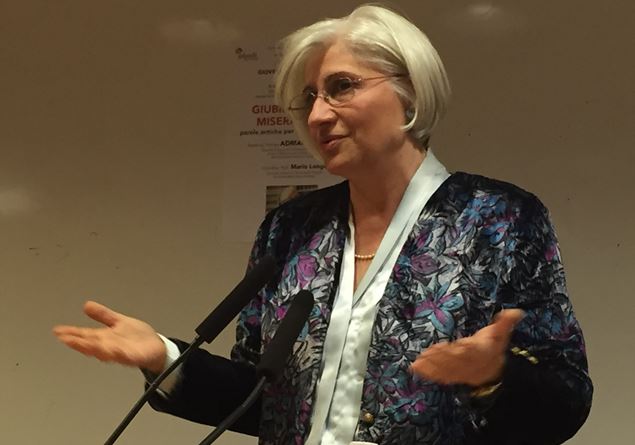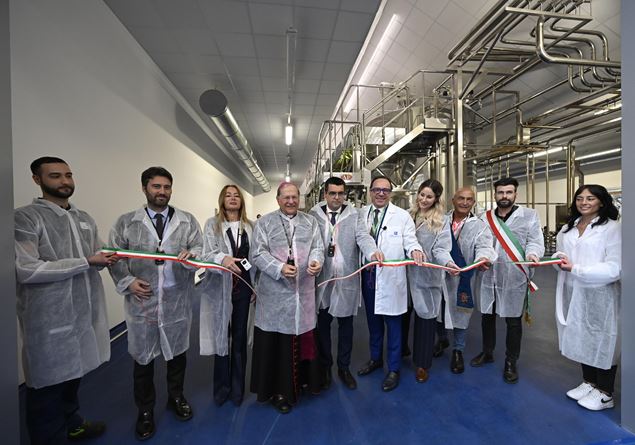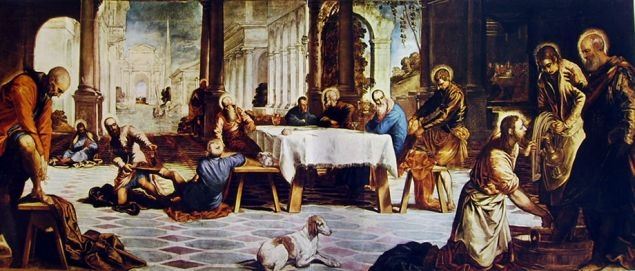In 1990, interviewed Adriana Valerio, for the “female” column that the Jesus magazine dedicated to women. Since then I have always followed his activity as a teacher of the history of Christianity and the churches at the Federico II University of Naples. Neapolitan, 72 years old, married, two children and a granddaughter, a life, his, dedicated to family and historical and theological research on the female reality: “It is out of passion that I have approached theology”, he confides, “and it is always out of passion that I continue to return historical memory to women”. He was also president of the European Society of Women for Theological Research and the Valerio Foundation for the history of women; Among the founders of the coordination of Italian theologians, he directs the international and interconfeditional project “The Bible and the women”.
A few days ago his latest book has been published “The roots of the world. Eva, women and the Bible” (Mondadori, (2025), in which he shares the fruit of over forty years of work proposing “a reinterpretation of the female figures of the Bible that exceeds traditional interpretations. Going beyond the simple reading of the text, unmask the historical prejudices and investigates the complex relationship between the sacred and the gender issues, with particular reference to the reinterpretation ». The teacher feels questioned and guides his research within the Church “to go to the root of the profound reasons that had determined invisibility, marginality and discrimination of the woman in the Christian world”. Reading this book makes it rediscovered that “even the history of Christianity is, like all human experiences, one genrean intertwining of complex relationships in which the codes of the male and female interact, intersect and outline in the unfolding of a life of sharing within spaces of mutual exchange and enrichment, in a varied panorama of sensitivity and interpretative approaches “. Several books by Adriana Valerio who testify to this attention, we mention some: “Women and church. An gender history” (Carocci Editore, 2016); Mothers of the council. Twenty -three women at the Council Vatican II (Carocci Editore, 2012). Heretics. Women who reflect, dare, resist (Il Mulino, 2022). The subtitle is “Eva, the women and the Bible”.
Just Eva, why?
“Because the first woman is an archetype with a thousand facets and many meanings, many still to be explored: a symbolic representation of the human in search of its own autonomy. It is the archetype of our experience whose story does not offer answers but questions, does not close in the past, but opens to the future, and the evocative force of his figure invites us to think about the ambiguity of life and the enigma of human relationships “.
Does it mean that the Bible, its interpretation, influenced the history of women in the West?
«The Bible has been used to define male and female identity and to circumscribe roles according to hierarchical and male models. The female inferiority has been justified, for example, making use of some songs taken from Sacred Scripture. The Pericopes “Women Tacciano in the assembly” (1 Cor 14,34) offered the side to exclude women from all those areas that require an authoritative public word (judiciary, politics, preaching). The expression “the woman learns in silence, in full submission. I do not allow the woman to teach or dominate on man “(1 TIM 2,11-12) legitimized male supremacy in the family, society and in the ecclesial community ».
Does this fall into Eva’s sin?
“With his transgression (Gen 3) in the Divine Command he even made death enter the world according to a rooted and secular tradition that interpreted that myth as a historical event and thought that a first woman guilty of the evils of humanity had really existed. For this, we wonder if the Bible, drawn up in ancient, pre -modern and patriarchal eras, can say something new to us who live in a world of technologies and sciences and, in particular, if it can communicate today a positive message to women more and more eager to affirm their dignity and freedom “.
This book includes twelve chapters, each of which starts from a biblical verse relating to the myth of the origins that speaks to us of Eva (Gen 1-2) and is commented in the light of other steps of writing indicating some repercussions that the interpretation of those songs has had on the history of women.
“The themes that emerge do not belong to the past and are not confined to historical-academic curiosities, because they deeply question the topicality. Being in relation, generating life, care of creation, commitment to peace, being foreigners, exercise of doubt, the pain of motherhood and much more emerge from the texts, opening new perspectives, so as to rediscover the skills that women have had in assumed the responsibility for the choices, in exercising freedom, in knowing how to hold the weight of the children, in guarding life and planning a peaceful humanity of the land All ».
So symbolically, Eva with his choice made history moving.
“By allowing humanity to enter over time, to recognize one’s partiality in the relationship and to take responsibility for the life and care of the world; He indicated that Eden is not in the remote past, but it is in front of us, as a place of awareness and happiness to be achieved. In this sense, the myth speaks of an unpublished future that must be expected and built, and, for this reason, does not console but shakes, because it recalls us deep in our being: at the roots of the world and our history ».










